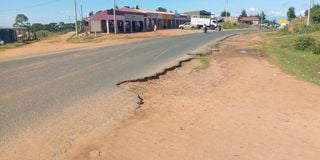Planned mega road expected to enhance links to South Sudan

A section of the Kitale - Kapenguria- Lodwar highway. The road will link West Pokot and Turkana counties to South Sudan will be constructed by the government in partnership with African Development bank( AfDB).
What you need to know:
- The road will intersect and connect other critical international corridors, including the Northern Corridor (Corridor 1) A8 highway and the Lapsset corridor A10 highway in Webuye and Lokichar, respectively
- Stakeholders present lauded the government’s move, noting that the road will spur economic activities as West Pokot is endowed with hidden treasures worth tapping
The government, in partnership with the African Development Bank (AfDB), plans to build a mega road that will link West Pokot and Turkana counties with South Sudan, in a move expected to boost economic activities between the two countries.
The road will be an important link in efforts to enhance regional integration, trade and development.
A consultative forum was held in Kapenguria, West Pokot, last week where the Kenya National Highways Authority (Kenha) said the road will support regional integration in Kenya, Uganda and South Sudan, three of the five East African Community (EAC) member states, and the Great Lakes region.
“[Improving] the corridor will help reduce regional development imbalance in Kenya, as well as improve the environment for stimulating economic development in the area, including attracting private investment,” said Kenha project coordinator David Cherono.
The road will intersect and connect other critical international corridors, including the Northern Corridor (Corridor 1) A8 highway and the Lapsset corridor A10 highway in Webuye and Lokichar, respectively.
Procured contracts
Mr Cherono noted that the government had procured contracts for upgrading sections of Nakuru-Marigat-Loruk-Barpelo-Marich Pass.
He said training should be offered to youth, people with disabilities and women in non-technical areas on project jobs, which should be advertising in public places.
He encouraged the contractor to sink boreholes for the project and give them to local communities after construction work is completed.
“The contractor should consider climate adaptation measures through proper design of drainage facilities, level of road embankment and designing infrastructure that will be cheaply and easily replaced if damaged. We also advocate for the use of locally available materials,” he said.
He called on contractors to plant indigenous trees as part of the programme’s components.
He urged them to build rehabilitation centres for road accident victims and help expand health centres as part of their corporate social responsibility programmes regions.
“Construction and expansion of education facilities such as dormitories, classrooms, libraries, ablution and administration blocks will help the communities realise the benefits of the project,” Mr Cherono said.
“There will also be construction of public amenities and adaptation measures to minimise impacts on vulnerable groups.”
Local community benefits
He said the local community should benefit from employment opportunities and encouraged contractors to integrate women into workers’ and local project committees.
“Women [should] be given special preference and allocated 30 per cent of jobs as per the construction and should be represented equally in leadership roles,’’ he stated.
Stakeholders present lauded the government’s move, noting that the road will spur economic activities as West Pokot is endowed with hidden treasures worth tapping.





